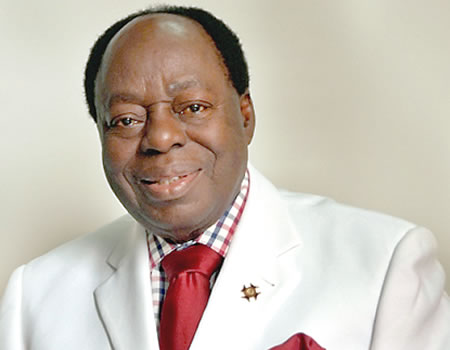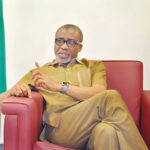
Nigeria may not enjoy quality and functional engineering education unless the labyrinth of problems of obsolete curricula, lack of students exposure to Industrial practice, quality of teaching staff and paucity of requisite experience, lack of coordination between research institutes and production enterprise, poor funding of education, poorly equipped laboratories and infrastructural challenges as well as discontinuance of technical education among several others are properly addressed and put in check.
Drawing from his ever flowing fountain of deep-rooted knowledge and far-reaching experience, the frontline legal colossus and Founder of Afe Babalola University, Ado-Ekiti, ABUAD, Aare Afe Babalola, CON, SAN, painted a picture of how a combination of the above obviously avoidable pitfalls has robbed Nigeria of its best skilled Engineers, Scientists, Technicians and Managerial personnel which many continually be in short supply if it is not addressed squarely.
Speaking during a Lecture titled “Funding of Engineering Education and Training for Self Reliance” at the Maiden edition of Ademola Olorunfemi Annual Public Lecture organised by the Ondo State Branch of the Nigerian Society of Engineers, NSE, in Akure, Babalola recalled the notorious fact of how Engineering Education, like others, has over time not been well funded by the different tiers of Government in Nigeria due to the attitude of the government and its people to education.
The former Pro Chancellor and Chairman of Council of University of Lagos, UNILAG, painted a rather low-spirited picture of how educational matters have consistently been taken with levity by different governments in Nigeria since 1948 when at the inception of the University College, Ibadan, government made people to believe unwittingly that it could (and probably still can) provide Free Education without taking due cognisance that education is a very expensive enterprise.
Worried by this cankerworm which has been subsisting since 1948, Babalola said: “If the government expects its citizens to be honest, it must also be honest in its dealings. It should be honest enough to inform citizens that quality and functional education is very expensive. It should be honest enough to review its policy on funding of education at all levels. The politicians must refrain from campaigning for votes based on impossible promises of ‘free education’”.
Citing the examples of Stanford, Yale, Oxford, Harvard, Cambridge Universities and Japan where more than 60% of all the universities are private universities, he added: “The government should encourage philanthropists and well-to-do Nigerians to establish private universities like the practice all over the world where the most successful universities were established by private people.
“Government should support private universities which have reached Postgraduate level by giving them subsidies that would enable them improve on their infrastructure and carry out researches…All Nigerians should be encouraged to endow Professorial Chairs and make generous donations to Universities. The Alumni Association of each university must be made to appreciate the need to give back to their universities. The money TETFund collects from private citizens should be available to Postgraduate students in private universities for research and development”.
On the place of Accreditation in ensuring quality Engineering education, Babalola expressed grave concern about the Accreditation granted to many universities running Engineering programmes in view of the obsolete equipment or inadequate facilities in most universities. This, according to him, is responsible for the poor quality of students produced by most Nigerian universities as a result of which their products are rejected by Industries and International Organisations.
But with the recent withdrawal of accreditation from many universities, including some first generation universities, it would appear the NUC, the Regulatory Authority for University Education in Nigeria, is tackling the problem of lopsided accreditation for which he commended the NUC Executive Secretary, Prof. Abubakar Rasheed. Babalola therefore canvassed for a more robust Accreditation and synergy between the NUC and Professional Bodies. In his view, both the NUC and the various Professional Bodies like the NSE, COREN and the Council for Legal Education should carry out Joint Accreditation and Visitation at the same time instead of visiting at different times. This will ensure enduring benefits to the country’s university system and the country at large.
He was uncomfortable with the present trend where Professional Bodies like COREN, MDCN and Council for Legal Education often interfere with the statutory powers of NUC under Section 10 of NUC Education (National Minimum standards and Establishment of Institutions) Act 1985 by challenging NUC on the quota given to universities, stressing that where a University has all the materials, the infrastructure, teaching materials and necessary equipment, the NUC should and ought to be allowed to perform its statutory function of determining the number of students to be admitted without let or hindrance.
Using his university to illustrate this malady, he said: “In ABUAD, 900 students applied to study Medicine during the 2018/2019 Academic Session. Whereas the NUC believes that it (ABUAD) is entitled to more students than 50,the MDNC insists on limiting the number to the barest minimum. This does not augur well for the Medical profession, the country, the parents and the students. It also discourages the Founders of private universities. Again, this is one more reason why there should be joint meetings between NUC and Professional Bodies in all cases”.
Another major problem facing Engineering education in Nigeria today is the entry qualification. Whereas in some other countries like England, the entry qualification for the study of Engineering is GCE A’ Level, but the reverse is the case in Nigeria where the entry qualification for Engineering is Ordinary WAEC (equivalent of GCE Ordinary Level). This has been further compounded by the Joint Admission and Matriculation Board (JAMB) which last year announced that Universities could admit students with as low as 120/400, a score of 30 per cent. He believes that this JAMB Admission cut-off point should be revisited, particularly as the entry point for every university is a matter to be decided by the Senate of each university having regard to their quality and acknowledgement by parents of applicants.
On the place and import of having qualified and well-trained teachers, particularly as teaching is a vocation and requires special training, Babalola said nobody should be allowed to teach at any level unless he has the prescribed qualification to teach at that level whether Elementary, Secondary or University or he/she is certified a teacher by a recognised Body that will set Certification examination.
His words: “If we are sincere in our search for quality Engineering education, COREN and NUC should insist on Teacher Training Certificate or that would-be teachers obtain certificate of participation from a Workshop on Teacher Training which ABUAD conducts annually”.
Unless Nigeria takes a voyage through this route, it may end up having local universities, using local materials to teach local students and end up producing local graduates that may not be fit for the ever competitive global employment market.
To curtail this, he suggested that Nigeria should have a Central Examination Board/Body for all final year students in Engineering and indeed students in all disciplines with students from all universities in all disciplines throughout the country taking the one and only one Final Examination organized by this Central Board/Body. This will no doubt ensure that standard and quality are maintained as the older universities will wake up while the young one would belt up and work harder.
Olofintila wrote from Ado-Ekiti





